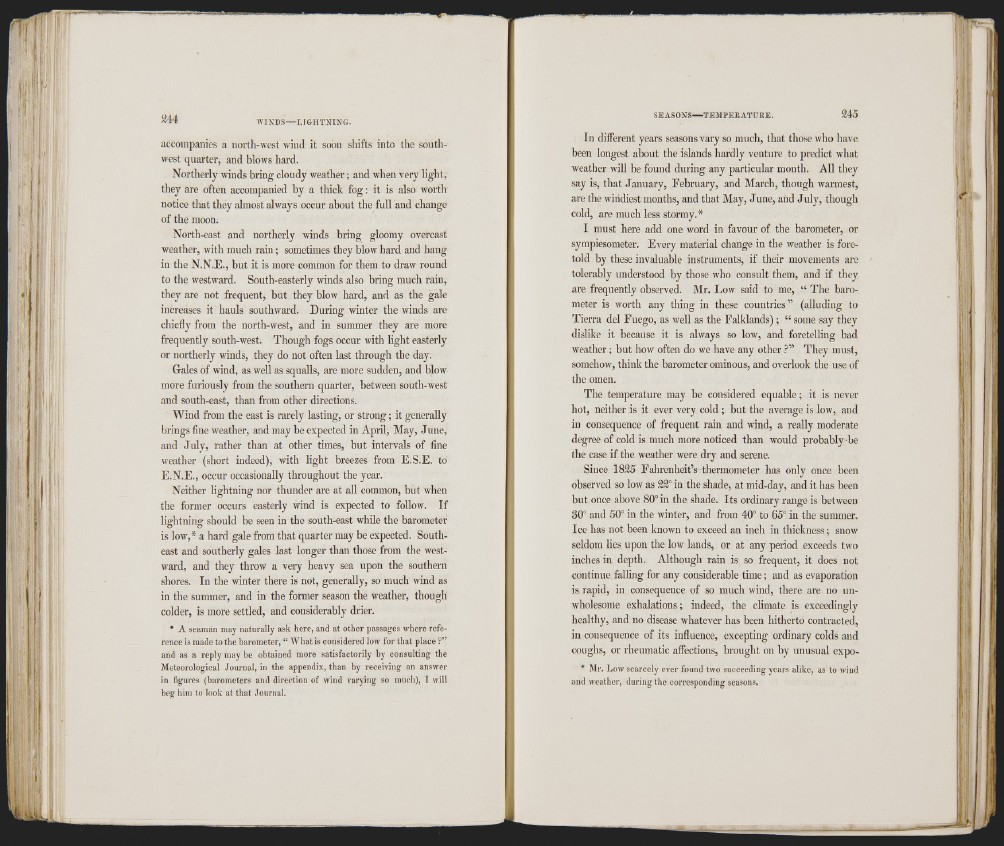
■f l■i,.
244 WINDS LIGHTNING.
accompanies a north-west wind it soon shifts into the southwest
quarter, and blows hard.
Northerly winds bring cloudy weather; and when very light,
they are often accompanied by a thick fog: it is also worth
notice that they almost always occur about the full and change
of the moon.
North-east and northerly winds bring gloomy overcast
weather, with much rain ; sometimes they blow hard and hang
in the N.N.E., but it is more common for them to draw round
to the westward. South-easterly winds also bring much rain,
they are not frequent, but they blow hard, and as the gale
increases it hauls southward. During winter the winds are
chiefly from the north-west, and in summer they are more
frequently south-west. Though fogs occur with light easterly
or northerly winds, they do not often last through the day.
Gales of wind, as well as squalls, are more sudden, and blow
more furiously from the southern quarter, between south-west
and south-east, than from other directions.
Wind from the east is rarely lasting, or strong; it generally
brings fine weather, and may be expected in April, May, June,
and July, rather than at other times, but intervals of fine
weather (short indeed), with light breezes from E.S.E. to
E.N.E., occur occasionally throughout the year.
Neither lightning nor thunder are at all common, but when
the former occurs easterly wind is expected to follow. If
lightning should be seen in the south-east while the barometer
is low,* a hard gale from that quarter may be expected. Southeast
and southerly gales last longer than those from the westward,
and they throw a very heavy sea upon the southern
shores. In the winter there is not, generally, so much wind as
in the summer, and in the former season the weather, though
colder, is more settled, and considerably drier.
• A seaman may naturally ask here, and at other passages where reference
Is made to the barometer, “ What is considered low for that place ?”
and as a reply may be obtained more satisfactorily by consulting the
Meteorological Journal, in the appendix, than by receiving an answer
in figures (barometers and direction of wind varying so much), I will
beg him to look at that Journal.
SEASONS—TEMPERATDKE. 245
In different years seasons vary so much, that those who have
been longest about the islands hardly venture to predict what
weather will be found during any particular month. All they
say is, that January, February, and March, though warmest,
are the windiest months, and that May, June, and July, though
cold, are much less stormy.*
I must here add one word in favour of the barometer, or
sympiesometer. Every material change in the weather is foretold
by these invaluable instruments, if their movements are
tolerably understood by those who consult them, and if they
are frequently observed. Mr. Low said to me, “ The barometer
is worth any thing in these countries” (alluding to
Tierra del Fuego, as well as the Falklands) ; “ some say they
dislike it because it is always so low, and foretelling bad
weather; but how often do we have any other .?” They must,
somehow, think the barometer ominous, and overlook the use of
tlie omen.
The temperature may be considered equable; it is never
hot, neither is it ever very cold ; but the average is low, and
in consequence of frequent rain and wind, a really moderate
degree of cold is much more noticed than would probably-be
the case if the weather were dry and serene.
Since 1825 Fahrenheit’s thermometer has only once been
observed so low as 22° in the shade, at mid-day, and it has been
but once above 80° in the shade. Its ordinary range is between
30° and 50° in the winter, and from 40° to 65° in the summer.
Ice has not been known to exceed an inch in thickness; snow
seldom lies upon the low lands, or at any period exceeds two
inches in depth. Although rain is so frequent, it does not
continue falling for any considerable time; and as evaporation
is rapid, in consequence of so much wind, there are no unwholesome
exhalations; indeed, the climate is exceedingly
healthy, and no disease whatever has been hitherto contracted,
in consequence of its influence, excepting ordinary colds and
coughs, or rheumatic affections, brought on by unusual expo-
* Mr. Low scarcely ever found two succeeding years alike, as to wind
and weather, during the corresponding seasons.